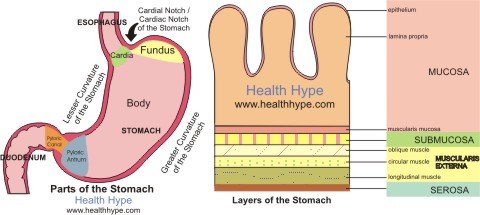Stomach Ulcers Symptoms, Causes, Treatment, Diet, Prevention
Stomach ulcers, or gastric ulcers, are open sores that occur on the stomach lining often as a result of chronic gastritis. The integrity of the stomach lining is compromised to the extent that the gastric secretions, particularly hydrochloric acid and pepsin, can erode small portions of the superficial layers of the stomach. In severe cases, the ulcer can lead to a bleeding ulcer (stomach bleeding) or perforation. Chronic gastric ulcers have been linked to stomach cancer.
Most stomach ulcers occur on the lesser curvature of the stomach near the junction between the body and antrum and may penetrate as deep as the muscularis mucosa. Refer to the picture below on the location and depth of stomach ulcers. These ulcers are usually large measuring more than 5 millimeters in diameter. In severe cases, these ulcers can extend up to 25 mm in diameter and may extend beyond the muscularis mucosa.
Causes of Stomach Ulcers
The most common causes of stomach ulcers are :
- H.pylori infection
- Non-steroidal anti-inflammatory drugs (NSAIDs)
The pathogenesis as well as other causes and contributing factors are explained in detail under What Causes Peptic Ulcers?
Simply, Helicobater pylori bacteria are able to withstand the stomach acid, attach to the lining of the stomach and increase gastric acid secretion. It also compromises the stomach’s natural protective mechanism against gastric acid, which involves a buffer layer of mucus secreted by the stomach lining. With NSAID use, the drugs hamper prostaglandin synthesis as part of its mechanism of action in relieving inflammation. However, this also disturbs the stomach’s ability to secrete mucus and protect the lining.
Other factors that may increase gastric acid secretion and irritate the lining may not directly cause stomach ulcers but can aggravate it. This includes :
- Cigarette smoking
- Excess alcohol consumption
- Stress (Nervous Stomach)
- Spicy foods
Rare causes are discussed under Causes of Peptic Ulcers.
Signs and Symptoms of Stomach Ulcers
Peptic ulcer symptoms, whether due to a stomach or duodenal ulcer, presents as :
- Stomach ache or abdominal pain that is gnawing or burning in nature. It is typically felt in the upper abdominal area or even under the left ribcage (refer to Stomach Location). The pain or discomfort tends to increase when hungry, immediately after eating and while asleep.
- Nausea and occasionally vomiting.
- Excessive belching and abdominal bloating.
- Change in appetite
Hematemesis (blood in the vomit) and/or melena (dark blood in stool) are signs of a bleeding ulcer.
Treatment of Stomach Ulcers
Treatment should be directed at the cause. In stomach ulcers due to H.pylori infection, triple eradication therapy as discussed under H.pylori Gastritis Treatment is necessary. This may have to be repeated as stomach ulcers are notoriously persistent.
In cases of stomach ulcers due to NSAIDs, these drugs should be discontinued. If this is not possible, the type of NSAID should be switched under the supervision of a medical doctor and pharmacist. Reducing the dose of the NSAIDs or concurrent use of proton pump inhibitors may be necessary.
Refer to Stomach Acid Medication for more information on drugs that reduce stomach acid and cytoprotective agents that coat the stomach ulcers thereby protecting it from the gastric secretion to allow it to heal.
Diet for Stomach Ulcers
Dietary management has limited use in the management of stomach ulcers. However avoiding foods that exacerbate the pain may be helpful. This includes spicy foods and caffeinated beverages. Alcohol consumption should be reduced significantly. With gastritis, certain foods may act as specific triggers and this may vary among individuals. Although not causative factors, identifying these trigger foods is essential in order to prevent exacerbations. Dietary measures as discussed under Gastritis Treatment may be relevant for stomach ulcers.
Prevention of Stomach Ulcers
Cigarette smokers are more likely to suffer with stomach ulcers and therefore smoking needs to be discontinued. In terms of H.pylori infection, good hygiene is important in preventing recurrent infections. Treating household contacts is also important as H.pylori can be transmitted by close oral contact like kissing. The use of NSAIDs should be limited and even avoided if possible. In chronic inflammatory conditions, the measures as described above under the treatment of stomach ulcers may have to be considered.






